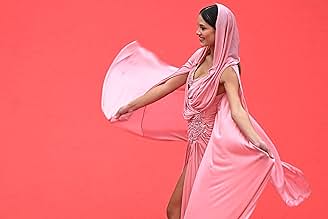VALUTAZIONE IMDb
7,7/10
17.813
LA TUA VALUTAZIONE
Un giovane insegnante spera di essere assegnato a Istanbul dopo il servizio obbligatorio in un piccolo villaggio.Un giovane insegnante spera di essere assegnato a Istanbul dopo il servizio obbligatorio in un piccolo villaggio.Un giovane insegnante spera di essere assegnato a Istanbul dopo il servizio obbligatorio in un piccolo villaggio.
- Regia
- Sceneggiatura
- Star
- Premi
- 15 vittorie e 10 candidature totali
Recensioni in evidenza
Turkish director Nuri Bilge Ceylan is probably the most confrontationally ambitious filmmaker working today. This doesn't necessarily make him the best. Indeed, there are times when you can feel him reaching for a greatness that the likes of Arichitapong Weerasthakul or Bela Tarr make seem easy. Nonetheless, Ceylan takes on the "Big Themes" with a Herculean boldness. He's the "old school great film artist" of today. His work sometimes feels like it belongs more in the era of Bergman or Bresson than today, but that doesn't make it any less impressive.
Ceylan's new film, "About Dry Grasses", is one of his best. The main character, Samet (played by Deniz Celiloglu in an at times overly intense performance), incarnates many of Ceylan's consistent concerns. Like many of the director's characters he is a secular intellectual, or at least he is striving to be one, to throw off the non-secular culture around him. In this, these characters reflect Turkey itself, a predominantly geographically and culturally Asian, Muslim nation that, since the inception of its modern state, has openly striven to become a secular, European one. He thinks too much, which is not to say too well, but this thoughtfulness is often a disguise or an excuse for a resentful selfishness.
Indeed, Samet is one of Ceylan's least likable main characters. At times, his actions disgust us. But the wisdom of the film comes with the acknowledgement that the decisions made by this quasi-anti-villain do not, in fact, amount to actual villainy. Samet is not who he, or we, wish him to be. But neither is humanity, or the world it inhabits. Time, the fact that life literally goes on despite our intentions, bestows on the living the transformative ability to apologize and forgive. (Hannah Arendt would, I think, have liked this movie.)
Ceylan is one of cinema's greatest landscape artists. Although "About Dry Grasses" consists mostly of interiors, the exterior scenes are breath taking. The small village Samet teaches in is supposed to be bleak and ugly and in some sense it is. But there is a sublimity to the revelation of these monotonous snow-scapes. Ceylan's landscapes give his films a singularly sensual quality. A viewer feels the chill of the town and the relief of a building with central heating or, to a less relieving degree, a fire, stove, or cup of hot tea. When winter finally breaks it seems a kind of existential reprieve.
One last note, while this is very much Samet's story, Celiloglu's is not the film's best performance. That goes to the Cannes-award-winning Merve Dizdar, whose performance is as smoldering as that of Celiloglu's, but also decidedly more restrained. The supporting cast, including young Ece Bagci, are generally excellent.
Ceylan's new film, "About Dry Grasses", is one of his best. The main character, Samet (played by Deniz Celiloglu in an at times overly intense performance), incarnates many of Ceylan's consistent concerns. Like many of the director's characters he is a secular intellectual, or at least he is striving to be one, to throw off the non-secular culture around him. In this, these characters reflect Turkey itself, a predominantly geographically and culturally Asian, Muslim nation that, since the inception of its modern state, has openly striven to become a secular, European one. He thinks too much, which is not to say too well, but this thoughtfulness is often a disguise or an excuse for a resentful selfishness.
Indeed, Samet is one of Ceylan's least likable main characters. At times, his actions disgust us. But the wisdom of the film comes with the acknowledgement that the decisions made by this quasi-anti-villain do not, in fact, amount to actual villainy. Samet is not who he, or we, wish him to be. But neither is humanity, or the world it inhabits. Time, the fact that life literally goes on despite our intentions, bestows on the living the transformative ability to apologize and forgive. (Hannah Arendt would, I think, have liked this movie.)
Ceylan is one of cinema's greatest landscape artists. Although "About Dry Grasses" consists mostly of interiors, the exterior scenes are breath taking. The small village Samet teaches in is supposed to be bleak and ugly and in some sense it is. But there is a sublimity to the revelation of these monotonous snow-scapes. Ceylan's landscapes give his films a singularly sensual quality. A viewer feels the chill of the town and the relief of a building with central heating or, to a less relieving degree, a fire, stove, or cup of hot tea. When winter finally breaks it seems a kind of existential reprieve.
One last note, while this is very much Samet's story, Celiloglu's is not the film's best performance. That goes to the Cannes-award-winning Merve Dizdar, whose performance is as smoldering as that of Celiloglu's, but also decidedly more restrained. The supporting cast, including young Ece Bagci, are generally excellent.
Once again, N. B. Ceylan has presented a magnificent gift to his audience and all cinema-lovers.
Ceylan, successfully following some essential footsteps of his former movies "Winter Sleep" and "The Wild Peer Tree", portraits the crises of restricted lives of (dazzlingly perfomed) characters feeling stuck in a provincial region of Turkey. It is even possible to call these movies a trilogy on masculinity, conflicts of intellectual class, "banality of evil" (as Hannah Arendt calls) and anti-heroes stuck in provincial stability, seeking for so-called "a better life elsewhere."
Regarding the visual narration of the movie, it is obvious that Ceylan has embraced a number of innovation on designing the visual aspects of the story; moving cameras, short-cuts for dialogue scenes etc. Nevertheless, the movie also preserves the beauty of Ceylan's well-known photographic cinema language.
Still, "Onca Upon A Time in Anatolia", among the works of N. B. Ceylan, is a cinematic top to me. And surely it is an extemely high bar for not only Turkish cinema. In this context, it may be asserted that "About Dry Grasses" could have easily been called a masterpiece if it belonged to any other director.
Ceylan, successfully following some essential footsteps of his former movies "Winter Sleep" and "The Wild Peer Tree", portraits the crises of restricted lives of (dazzlingly perfomed) characters feeling stuck in a provincial region of Turkey. It is even possible to call these movies a trilogy on masculinity, conflicts of intellectual class, "banality of evil" (as Hannah Arendt calls) and anti-heroes stuck in provincial stability, seeking for so-called "a better life elsewhere."
Regarding the visual narration of the movie, it is obvious that Ceylan has embraced a number of innovation on designing the visual aspects of the story; moving cameras, short-cuts for dialogue scenes etc. Nevertheless, the movie also preserves the beauty of Ceylan's well-known photographic cinema language.
Still, "Onca Upon A Time in Anatolia", among the works of N. B. Ceylan, is a cinematic top to me. And surely it is an extemely high bar for not only Turkish cinema. In this context, it may be asserted that "About Dry Grasses" could have easily been called a masterpiece if it belonged to any other director.
While we were patiently and curiously waiting for Merve Dizdar's award-winning performance throughout the movie, it was disappointing to encounter the parallel universe version of Gülben's character in Masumlar Apartment, or even less. I think many viewers will agree that Ece Bagci did a more impressive and convincing job in terms of art with her performance as Sevim. I guess we can say that political decisions have once again overshadowed creativity and art.
Apart from that, when I think about Nuri Bilge Ceylan's filmography, it was a movie where I saw humorous elements that made me smile for the first time after the melon scene placed next to the corpse in the trunk in Once Upon a Time in Anatolia. But unlike Once Upon a Time in Anatolia, the dialogues of the characters felt like they were actually the director's monologue. I had the same feeling, especially in Winter Sleep and Pear Tree. The film stands out among the director's recent films in terms of flow, humor and abundance of dialogue.
Apart from that, when I think about Nuri Bilge Ceylan's filmography, it was a movie where I saw humorous elements that made me smile for the first time after the melon scene placed next to the corpse in the trunk in Once Upon a Time in Anatolia. But unlike Once Upon a Time in Anatolia, the dialogues of the characters felt like they were actually the director's monologue. I had the same feeling, especially in Winter Sleep and Pear Tree. The film stands out among the director's recent films in terms of flow, humor and abundance of dialogue.
Probably Nuri Bilge Ceylan's movie with the most dialog. If you don't mind spending three and a half hours sitting, you will watch it with interest. The acting is incredibly successful. Deniz Cellioglu's acting as Samet is incredible. Merve Dizdar had already proven her success by winning the best actress award at the Cannes film festival for her acting in this movie. Centering on a handful of teachers in a snow-covered village in Anatolia, we watch an extraordinary story with a great script. Although the prolonged dialogues sometimes slow down the pace, I think you will enjoy the film in general. Especially the naturalness of the small actors in the student roles is magnificent. During Nuray and Samet's long conversation at the dinner table, there are inconsistencies in terms of continuity in the positions of the actors at different camera angles. Ceylan is already a master photographer. He reflected this mastery in his movie. I found his use of the camera very successful, especially in tight spaces. Some of the sentences interspersed between the dialogues still impress me. It will be very surprising if this movie is not among the best foreign film nominees for the Oscars. It was one of the two movies I saw this year that I can say I liked very much. I hope the majority feel the same way.
An absolute masterpiece! I'm tempted to give it five stars, but I'll determine that upon rewatch. About Dry Grasses is a powerful, albeit quiet tale that explores the pursuit of meaning and the lack of control in life, told from the singular lens of a bored and self-absorbed man trapped in a teaching position. In its bloated three-hour runtime, Ceylan seems to simulate the monotonous quality of rural life and brings an authentic personality and candidness to the characters by means such as using minimal music, featuring prolonged scenes, etc. Some might consider this relentless realism as boring, but the script isn't short of emotionally riveting moments and has a slight wittiness and humorousness in the dialogue that makes it very entertaining to sit through. Obviously, all the performances are tremendous and the beautiful cinematography highlights the alienation and oppression that characters must feel. Especially with Deniz Celiloglu, who threads a fine line between angst and friendliness yet always earns the audience's empathy despite his questionable behaviour. More than a mere narrative, About Dry Grasses serves as a profound character study, beckoning us into Samet's psyche, while simultaneously encouraging us to critique him. Ultimately, About Dry Grasses works as a film about the fragility of friendship, the perils of narcissism and serves as a cautionary tale on not letting our human nature detract from our appreciation of life. This is definitely one of the best films of 2023 that I've watched so far, and also one of the most underrated.
Lo sapevi?
I più visti
Accedi per valutare e creare un elenco di titoli salvati per ottenere consigli personalizzati
- How long is About Dry Grasses?Powered by Alexa
Dettagli
- Data di uscita
- Paesi di origine
- Siti ufficiali
- Lingua
- Celebre anche come
- About Dry Grasses
- Luoghi delle riprese
- Nemrut, Adiyaman, Turchia(archeological site)
- Aziende produttrici
- Vedi altri crediti dell’azienda su IMDbPro
Botteghino
- Budget
- 3.500.000 € (previsto)
- Lordo Stati Uniti e Canada
- 118.955 USD
- Fine settimana di apertura Stati Uniti e Canada
- 14.651 USD
- 25 feb 2024
- Lordo in tutto il mondo
- 2.305.695 USD
- Tempo di esecuzione3 ore 17 minuti
- Colore
- Mix di suoni
- Proporzioni
- 2.39 : 1
Contribuisci a questa pagina
Suggerisci una modifica o aggiungi i contenuti mancanti

Divario superiore
What is the Canadian French language plot outline for Racconto di due stagioni (2023)?
Rispondi





























